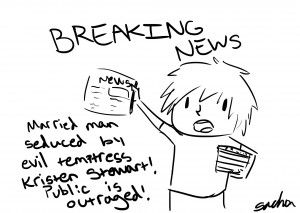If you still need convincing that sexism and the double-standard of morality that it brings is still alive in well, look no further than the recent scandal involving Kristen Stewart and producer Rupert Sanders.
As the drama ensued, millions of people felt as if their irrational hatred of the actress had finally been validated. Finally, she had done something objectively more loathsome than scowling and giving unbearably awkward interviews. She had cheated on Edward Cullen.
Because “Twilight” is the holy grail of poorly-written, hormone-fueled teenybopper fiction, it is also one of the most widely read and adored book series ever. This means that the breaking of Edward Cullen’s sparkly vampire heart angered unprecedented numbers of pre-pubescent girls whose list of desired qualities in a boyfriend include stalkerish, possessive, destructive and emotionally manipulative.
This reaction was obviously anticipated. What wasn’t anticipated, however, was the sheer volume of hatred directed toward Stewart that did not come from girls in junior high whose biggest concern is who to sit next to in biology lab. People, within and without Hollywood, were actually, genuinely angry about it.
Why? Your guess is as good as mine. As far as I could tell, the only people with the right to be angry were those whose personal lives and relationships were directly impacted. In the real world, which is devoid of paparazzi, an impulsive young person cheating on their significant other and kissing a married man is hardly headline-worthy stuff. That individual would have to deal with the repercussions that tear through their personal life, but no one outside of their close circle would care even a little.
Oddly enough, everyone felt entitled to cast their judgment on both parties involved.
Mostly, though, they felt entitled to cast their judgment on Stewart. Despite the fact that she is a young, foolish 22-year-old with a boyfriend and her producer is a 41-year-old husband and father, much of the blame fell on her.
It is as if feminism had been set back at least a century overnight: Stewart was cast as an evil temptress who seduced a poor man clearly rendered powerless by her machinations. Apparently, I’d been naive to hope that such reductive and sexist caricatures were now considered archaic.
As for the grown man who cheated on his wife, has he been on the receiving end of equal levels of hostility from strangers? Not even close. I’ve rarely heard anyone use his name, I can only assume be — cause it’s irrelevant — he’s just “the producer” that Stewart worked her demon magic on, leading him away from his wife. Granted, Stewart is the more high-profile member of the scandal, but that doesn’t change the fact that the over-the-top reaction has been grossly disproportionate given the circumstances.
Were Stewart’s actions wrong? Well, yes. But she is not an evil temptress. She’s a human being who made a mistake.
I read a brilliant Huffington Post article on the subject that called the phenomenon “slut-shaming,” pointing out that it is a phenomenon that has wider-reaching implications than just the vitriol that goes hand-in-hand with celebrity culture. The author, Nico Lang, expressed concern for young women growing up in a culture that vilifies and shames women who make mistakes similar to Stewart’s while men escape relatively unscathed.
The sad truth is that women are equally to blame for perpetuating this double-standard. Girls are often incredibly quick to label other girls as “sluts,” whether on the basis of their clothing or dating choices; or else for the regrettable mistakes they make as young people. We have come to expect name-calling and harsh judgment from the junior high girls who read Twilight — such is adolescence. But the fact is that the adult equivalent is poisoning our societal treatment of young women and should be alarming and disconcerting to us.


